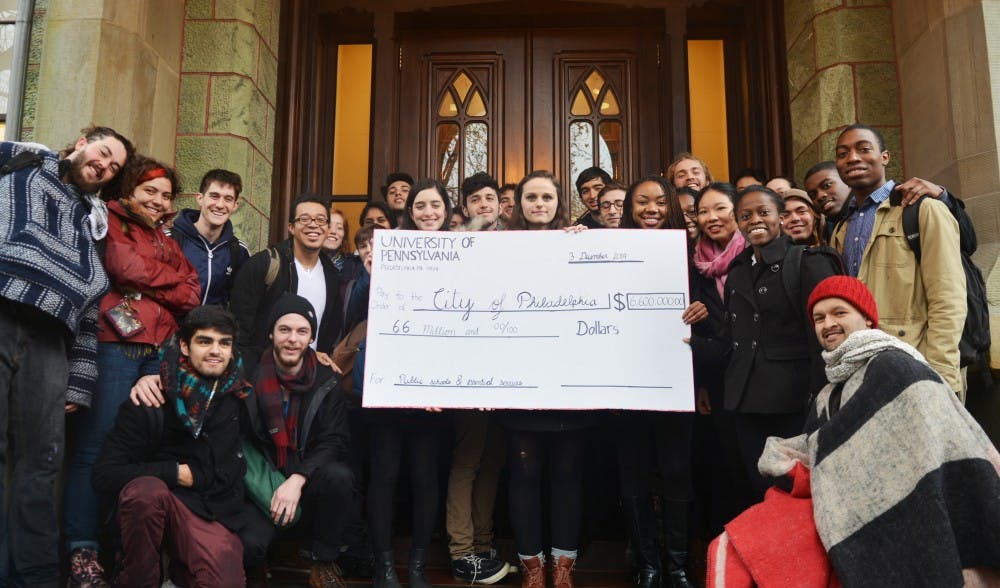Payments in Lieu of Taxes have been on the radar for many Penn students over the past several months. Penn students, led by members of the Student Labor Action Project, demonstrated at Penn President Amy Gutmann’s annual holiday party in December to pressure the University to make PILOT payments to the city. This, in turn, they hoped would help the cash-strapped School District of Philadelphia.
The Daily Pennsylvanian broke down the jargon into the main points Penn students should know about PILOTs and what they mean for Philadelphia.
1. What are PILOTs, and who does (and does not) pay them?
PILOTs are monetary contributions that nonprofits voluntarily make to cities. These payments account for essential city-provided services they use like fire and police protection, trash pick-up and road maintenance.
According to Pennsylvania law, nonprofits — like Penn — are exempt from paying property taxes. As a large land-holding nonprofit in the city, Penn along with other universities, has felt pressure in the past several years to make contributions to the city through PILOTs.
The Lincoln Institute of Land Policy’s survey in 2011 showed that at least 218 localities paid PILOTs in at least 28 states. In 2011, the largest contributor of PILOTs in Philadelphia was the retirement community Cathedral Village, which gave $272,000 that year. In the city overall, total contributions fell from $9 million in 1995 to below $500,000 in 2011.
Penn and Columbia University are the only two Ivy League schools that do not contribute PILOTs to their local governments. Yale, for example, pays the city of New Haven over $8 million annually.
Penn has argued in the past that what other universities do for their cities should have no bearing on what is right for Penn and Philadelphia, citing the much larger size of the city compared to New Haven and others. The University has held firm in declining requests to pay PILOT contributions.
2. Why doesn’t Penn pay PILOTS?
Penn has argued that it contributes to the city of Philadelphia in positive ways other than PILOTs. As evidence, the University has referenced its partnership with local schools through the Netter Center for Community Partnerships, as well as the $21 million Division of Public Safety budget that employs a 116-member accredited police force.
The University specifically cites, among many other things, their $800,000 annual contribution to the Penn Alexander School, as well as the fact that Penn is the largest private employer in the city.
In 2013, a report about Penn and 11 other area institutions was submitted to the Philadelphia Higher Education Government Relations Officers Group in response to a call for PILOTs. The report looked at the ways that universities benefit the city both financially and in other ways. It touted the "Philadelphia Model” as a unique partnership between institutions of higher education and the cities that surround them.
3. Why is Penn being asked to pay PILOTs?
Property taxes — from which Penn and other nonprofits are exempt — go in part towards the public school system in Philadelphia. Due to budgetary issues, 23 Philadelphia schools were closed in the spring of 2013.
Those pushing for Penn to pay PILOTs, such as SLAP, contend that the sum they are requesting — $6.6 million — would be a small part of Penn’s annual budget.
Penn was previously part of a PILOT payment agreement during former Mayor Ed Rendell’s administration between 1995 and 2000, but the $1.93 million annual contribution was not renewed after that year.
4. What is being asked of Penn?
Last June, West Philadelphians gathered at a community meeting organized by Philadelphia Jobs with Justice to distribute and sign a petition addressed to Penn President Amy Gutmann to request $6.6 million in PILOTs from Penn.
SLAP members gathered at College Hall back in December to formally ask Gutmann for the contribution.
5. How much would PILOTs help?
It is hard to say, exactly. Back when Penn was involved in the 5-year PILOT agreement, 55% of the money received went to the school district. Those doubtful of the impact question how much of the requested contributions would make their way into actual classrooms. With a district that will be operating with about an $80-million-dollar deficit for the upcoming year unless money comes through from somewhere else, proponents might say that anything would go a long way.



